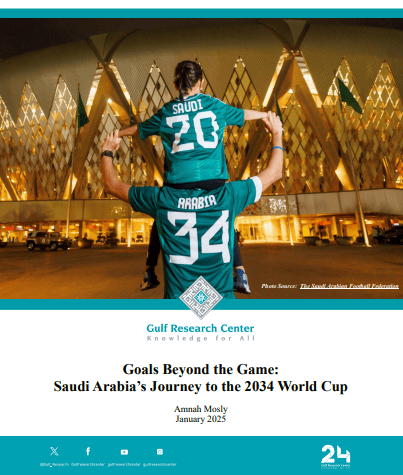
Saudi Arabia’s successful bid to host the 2034 FIFA World Cup is yet another milestone in the Kingdom’s overall Vision 2030 agenda, aiming to diversify its economy and enhance its global standing. While not uncontroversial by some, the Kingdom’s bid received much acclaim, including the approval of over 200 FIFA member federations. This decision comes after FIFA published its evaluation of Saudi Arabia’s proposal, which earned an average score of 4.2 out of 5. Overall, the bid was the highest-performing World Cup host bid in the organization’s history.
The 2034 World Cup is poised to make an impact across various sectors in the Kingdom, including infrastructure development, economic growth, social cohesion, cultural exchange, and tourism. Despite a largely positive evaluation, the World Cup decision also brought with it a host of negative criticism, similar to much of the coverage in conjunction with Qatar in its hosting of the World Cup in 2022. There will be many important lessons to be drawn from Doha’s experience. Before doing so, however, it is equally important to explore the reasoning behind the Kingdom’s sports emphasis in terms of youth engagement, public health, job opportunities, and community engagement, and to further enhance its football culture.
Infrastructure Development and Economic Growth
Saudi Arabia’s bid includes plans for 15 stadiums across five host cities: Riyadh, Jeddah, Al Khobar, Abha, and NEOM. Notable venues such as the King Salman International Stadium in Riyadh, designated for the opening match and the final, and the futuristic NEOM Stadium exemplify the Kingdom’s stated commitment to building state-of-the-art facilities.
Such infrastructure projects are expected to stimulate economic growth by creating job opportunities across various sectors, including construction, hospitality, and support services. A report by the Kingdom’s Ministry of Sports indicates that Saudi Arabia has already created over 14,000 jobs in the sports industry to date, aimed at Saudi nationals under the Saudization program, a number that is most likely to increase to over 100,000 jobs in the next decade as the Kingdom is also preparing to host both the AFC Asian Cup in 2027 and the Asian Winter Games in 2029 ahead of the World Cup. Overall, there has been a 129% growth in sports club employment driven by new programs, a 114% rise in career opportunities in sports from 2018 to 2021, and a 156% increase in administrative roles during the same period. The report also highlights a projected $16.5 billion in annual contributions to GDP by the sports industry by 2030, equating to 1.5% of GDP.
The influx of tourists and fans worldwide will also invigorate the tourism sector, increasing revenues and further supporting economic diversification. The anticipated spending by visitors is projected to provide a boost to the national economy, building on the Kingdom’s recent milestone of attracting 100 million visitors in 2023, seven years ahead of the scheduled goal in 2030. Experts have explained that Saudi Arabia could expect a gross domestic product boost of between $9 billion and $14 billion from the event. While there are obvious costs to hosting the World Cup, economic gains have also been associated with the event. For example, in Qatar’s case, the IMF reported that “near-term contributions to Qatar’s economy, from visitors’ spending and WC-related broadcasting revenue, of up to 1 percent of GDP was comparable to cross-country experiences.”
Societal Benefits
Beyond the economic implications, hosting the World Cup offers a unique opportunity to strengthen social cohesion and promote cultural exchange. The event will serve as a platform for showcasing the Kingdom’s achievements in sports and cultural heritage. For one, there has been a recorded 350% increase in sports activity among Saudi citizens since 2015, demonstrating both the demand and the interest in sports in the Kingdom. The increase recorded has been mainly for two groups: women and youth.
Saudi Arabia has also made strides in boosting female participation in sports. Over 400,000 women now participate annually in sports activities, with a 149% increase in female participation in sports since 2015. In addition, there are over 330,000 registered female athletes, alongside thousands of female coaches, mentors, referees, and sports doctors.
Another key aspect in improving the quality of life across the country is motivating the youth to engage in entrepreneurial activity. Promoting sports is not only creating job opportunities but also aims at encouraging a healthier lifestyle for the youth and providing positive outlets. In these ways, sports serve as a means to promote social cohesion within states and the region as a whole. The development of the sports sector has been a vehicle for many factors that build social cohesion, such as improved mental and physical health, higher education, and more employment opportunities.
Sports have therefore become a primary vehicle for broadening the overall scope of productive economic engagement in the Kingdom. Saudi Arabia’s Minister of Sport, HRH Prince Abdulaziz bin Turki Al-Faisal, stated that “hosting major sports events, and football in specific, plays an integral part in our country’s transformative Vision 2030 to increase participation. I do not doubt that this … will inspire young boys and girls across the country to participate in sports and dream of representing their country one day.” Additionally, Yasser Al-Misehal, President of the Saudi Arabian Football Federation (SAFF), also expressed the Kingdom’s excitement to welcome international fans to the “diverse cultures and cities our beautiful country has to offer.”
Global Perception
The above developments have not been impervious to controversy. The claim that Saudi Arabia is “sports-washing” its image by investing in and developing sports is one of the primary allegations leveled against the country. However, when viewed through the lens of Vision 2030, it becomes evident that sports must be recognized as an integral aspect of the Kingdom’s goal for economic diversification. Sports are a primary means of providing a range of benefits to Saudi citizens as well as a source of opportunities for active participation for the country’s larger population. Moreover, sports enhance the overall scope of productive economic involvement by encouraging the youth to engage in entrepreneurship.
Overall, the sports industry is rather profitable, making it an important and valid component of any diversification strategy. Moreover, large-scale sporting events are thought to have a significant financial impact on the local economic landscape. As a result, the Saudi Arabian General Investment Authority (SAGIA) has sought to promote Saudi Arabia as a top investment location.
Therefore, from a business perspective, investing in sports and hosting international events has great value.
It is also important to highlight that sports in the Kingdom is nothing new. Football, in particular, has always been more than just a sport in Saudi Arabia; it has been one of the most significant contributors that have shaped national identities. Since the establishment of the Saudi Arabian Football Federation in the 1950s and the creation of the national league, football has grown into the most widely followed and celebrated sport in the Kingdom. In particular, the Saudi Pro League (SPL) has become a source of immense pride, with club rivalries, historic matches, and fan culture for Saudi nationals. One of the key aspects of Saudi football culture is the intense local support for club teams. Whether Al-Ittihad, Al-Ahli, Al-Nassr, or Al-Hilal, the loyalty to these clubs runs deep and often transcends generations. Al-Nassr, for example, traditionally had a large fanbase even before Cristiano Ronaldo’s commitment to the club.
Furthermore, the Saudi national team has long been a source of pride, particularly with the Kingdom’s frequent appearances in the FIFA World Cup, especially during the 1994 debut, when the Saudi team reached the knockout second round for the first time and was nicknamed “the Green Falcons.” After their upset victory against Argentina in the 2022 World Cup, the Kingdom declared a public holiday, underlining the depth of the love of sports in Saudi Arabia.
Yet, this aspect of Saudi culture often does not receive the global recognition it deserves, particularly when compared to more high-profile footballing nations. It is only recently that accessibility and variety of sports have been expanding and have thus been put in the spotlight. In 2024, Riyadh was listed among the world’s top 50 sports cities in Burson’s 2024 Ranking of Sports Cities. Standing at number 42 globally, Riyadh jumped 23 spots from its 2023 ranking of 65th place.
In the year 2024 alone, Saudi Arabia has hosted various large-scale sporting events, such as:
Conclusion
Saudi Arabia’s 2034 FIFA World Cup hosting is more than a sporting event; it is a strategic initiative that aligns with the Kingdom’s Vision 2030 goals. The anticipated impacts span economic growth, social development, cultural exchange, and international recognition. From this perspective, a solid argument can be made that the Kingdom is poised to leverage the benefits of this event to strengthen its position on a global scale, inspire future generations, and contribute to further sustainable development.
*Amnah Mosly is a Researcher at the Gulf Research Center (GRC)

